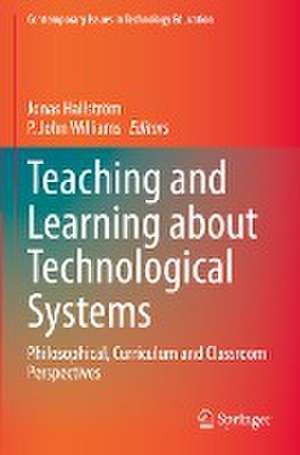Teaching and Learning about Technological Systems: Philosophical, Curriculum and Classroom Perspectives: Contemporary Issues in Technology Education
Editat de Jonas Hallström, P. John Williamsen Limba Engleză Paperback – 2 feb 2023
| Toate formatele și edițiile | Preț | Express |
|---|---|---|
| Paperback (1) | 870.79 lei 6-8 săpt. | |
| Springer Nature Singapore – 2 feb 2023 | 870.79 lei 6-8 săpt. | |
| Hardback (1) | 876.67 lei 6-8 săpt. | |
| Springer Nature Singapore – feb 2022 | 876.67 lei 6-8 săpt. |
Preț: 870.79 lei
Preț vechi: 1061.94 lei
-18% Nou
Puncte Express: 1306
Preț estimativ în valută:
166.68€ • 174.97$ • 137.69£
166.68€ • 174.97$ • 137.69£
Carte tipărită la comandă
Livrare economică 30 ianuarie-13 februarie 25
Preluare comenzi: 021 569.72.76
Specificații
ISBN-13: 9789811677212
ISBN-10: 9811677212
Pagini: 249
Ilustrații: XVI, 249 p. 56 illus., 32 illus. in color.
Dimensiuni: 155 x 235 mm
Greutate: 0.38 kg
Ediția:1st ed. 2022
Editura: Springer Nature Singapore
Colecția Springer
Seria Contemporary Issues in Technology Education
Locul publicării:Singapore, Singapore
ISBN-10: 9811677212
Pagini: 249
Ilustrații: XVI, 249 p. 56 illus., 32 illus. in color.
Dimensiuni: 155 x 235 mm
Greutate: 0.38 kg
Ediția:1st ed. 2022
Editura: Springer Nature Singapore
Colecția Springer
Seria Contemporary Issues in Technology Education
Locul publicării:Singapore, Singapore
Cuprins
1. Introduction.- 2. The notion of a system compared to an artefact.- 3. The evolution of technological systems.- 4. The "impacts" of technological systems.- 5. Technological systems in some national standards and curricula.- 6. Systems theory, systems thinking, and systems concepts in relation to technology education.- 7. Central concepts and models of systems, in technology compared to other fields.- 8. From component to systems: Fostering systems thinking via electronics studies.- 9. Students' perceptions of control systems and autonomous systems.- 10. Functional analysis and its tools: How teachers use them to study technical systems with pupils 11-14 years old in France.- 11. Defining "qualities of knowledge" about technological systems.- 12. Central educational models and modes for teaching about technological systems.- 13. Postscript and synthesis.
Notă biografică
Dr Jonas Hallström is Professor of Technology Education and Research Director of technology education at TESER, Technology and Science Education Research, Department of Behavioural Sciences and Learning (IBL), Linköping University, Sweden. There, he does research, supervises doctoral students and teaches technology education. Professor Hallström’s research interests primarily relate to the historical emergence of technology as knowledge content in the school, the epistemology and subject philosophy of technology, various subject content such as technological systems and history of technology, as well as the attitudes to, and knowledge of, technology and technology education of students, student teachers and teachers. His research also deals with technology teaching in relation to, for example, design, gender (girls and technology), authentic learning, models and modelling and Science, Technology, Engineering, Mathematics (STEM) education.
Dr P. John Williams is Professor of Education and Director of Graduate Research in the School of Education at Curtin University in Perth, Western Australia. There, he teaches and supervises research students in Science, Technology, Engineering, Mathematics (STEM) and technology education. Apart from Australia, he has worked and studied in New Zealand and the United States and a number of African and Indian Ocean countries. His current research interests include STEM, mentoring beginning teachers, pedagogical content knowledge (PCK) and electronic assessment of performance. He regularly presents at international and national conferences, is consulted on technology education in a number of countries and is a longstanding member of eight professional associations. He is Advisory Editor of the International Journal of Technology and Design Education, Series Editor of the Springer ‘Contemporary Issues in Technology Education’ book series and is on the editorial board of six other professional journals.
Dr P. John Williams is Professor of Education and Director of Graduate Research in the School of Education at Curtin University in Perth, Western Australia. There, he teaches and supervises research students in Science, Technology, Engineering, Mathematics (STEM) and technology education. Apart from Australia, he has worked and studied in New Zealand and the United States and a number of African and Indian Ocean countries. His current research interests include STEM, mentoring beginning teachers, pedagogical content knowledge (PCK) and electronic assessment of performance. He regularly presents at international and national conferences, is consulted on technology education in a number of countries and is a longstanding member of eight professional associations. He is Advisory Editor of the International Journal of Technology and Design Education, Series Editor of the Springer ‘Contemporary Issues in Technology Education’ book series and is on the editorial board of six other professional journals.
Textul de pe ultima copertă
This book discusses the teaching and learning about technological systems in technology education and adjacent curriculum areas. It describes, analyzes and synthesizes contemporary research on technological systems in technology education. By delving into the philosophy, sociology and history of technology, technology education and the learning and teaching of technological systems, it summarizes prior research and analyzes new research. This book thereby serves as a resource and reference work for professionals in this area of research and education.
Caracteristici
Showcases discussions on central technological systems issues by prominent STEM education researchers Highlights relationships between the content of systems and appropriate pedagogical approaches Proposes research-based pedagogical recommendations for technological systems education











